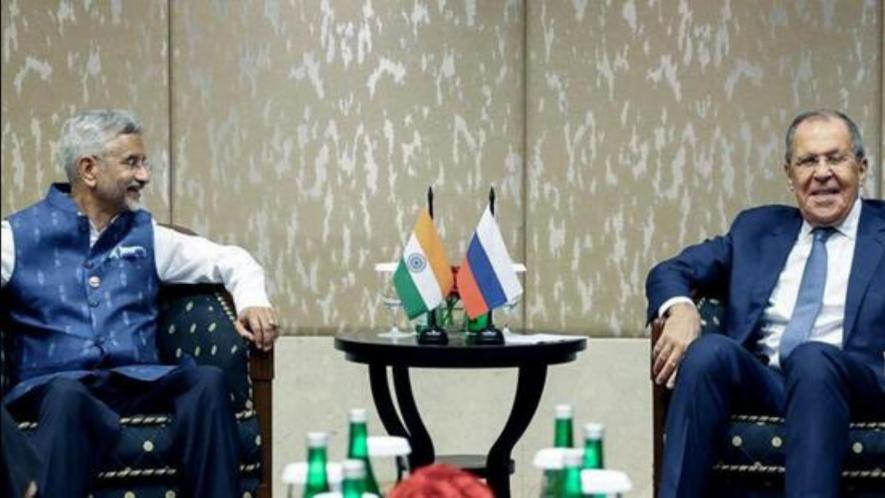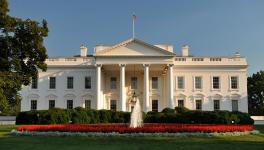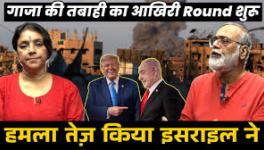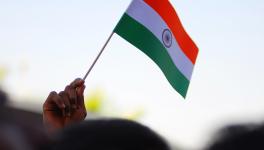Ice Cracking Sounds on Frozen Lake of US-Russia Relations

India’s External Affairs Minister S. Jaishankar (L) met Russian Foreign Minister Sergey Lavrov, Jakarta, September 6, 2023
Any long-time observer of Russian politics would know that the state of play in the Russian-American tango is best assessed from sub-plots, often obscure and unnoticed, away from its amphitheatre where gladiators cross swords. Therefore, two alleys on Ukraine crisis need to be explored.
One is the meeting between Russian Foreign Minister Sergey Lavrov and his Indian counterpart S. Jaishankar in Jakarta on the sidelines of the East Asia Summit and the other the unannounced arrival of US Secretary of State Antony Blinken in Kiev. Both events happened on Wednesday. The cypher traffic between Jakarta, Kiev, Moscow and Washington would have been pretty heavy during the past 48 hours.
The Russian readout on Lavrov’s meeting with Jaishankar said that the two ministers “exchanged views on the most pressing issues of bilateral relations and international issues… A mutual desire to increase coordination in multilateral formats, primarily at the UN, as well as within the SCO, BRICS and the G20, was emphasised.”
Evidently, what warranted the meeting was the feverish Indian attempt to work out a formulation on Ukraine for the G20 Declaration that would enable the Narendra Modi government to claim a diplomatic triumph.
Last week, Lavrov warned that “There will be no general [G20] declaration on behalf of all members if our position is not reflected.” But Jaishankar would know that an axiom of Russian diplomacy is, “Never say never”.
It seems unlikely that Moscow will stand in the way of Modi holding a trophy when the G20 concludes on Sunday. For President Joe Biden too, a successful Modi becomes a more effective partner in the Indo-Pacific.
In fact, the White House announcement highlighted that “While in New Delhi, President Biden will also commend Prime Minister Modi’s leadership of the G20 and reaffirm the US commitment to the G20 as the premier forum of economic cooperation, including by hosting it in 2026.”
Some compromise formula on Ukraine may still be negotiated. If so, its parameters will be an indicator of the extent to which Moscow and Washington are inclined to bridge their respective interests and expectations.
Meanwhile, on September 6, Blinken embarked on quite an untypical visit to Kiev. There was no fire in his belly. For once, he didn’t threaten Russia or ridicule Putin from Ukrainian soil. Nor did Blinken show much enthusiasm for Kiev’s counteroffensive.
Rather, his focus was rather on the war’s horrific trail causing human suffering, Ukraine’s post-conflict recovery as a democracy and its economy’s reconstruction. Blinken said repeatedly that he was undertaking the visit on Biden’s instruction. In the presence of President Zelensky, Blinken stated:
“We are determined in the United States to continue to walk side by side with you. And President Biden asked me to come, to reaffirm strongly our support, to ensure that we are maximising the efforts that we’re making and other countries are making for the immediate challenge of the counteroffensive as well as the longer-term efforts to help Ukraine build a force for the future that can deter and defend against any future aggression, but also to work with you and support you as you engage in the critical work of strengthening your democracy, rebuilding your economy.”
Stirring words, but there was no boastful talk of liberating Crimea, carrying the fight into the Russian camp or forcing Russia to vacate the annexed territories and negotiating with Russia only from a position of strength. At Blinken’s joint press availability with Ukrainian Foreign Minister Dmytro Kuleba, the latter claimed that they had a “substantive” discussion on providing long-range rockets, ATACMS to Kiev. But Blinken sidestepped the topic.
The most unusual thing about Blinken’s visit was that it spilled over to a second day. This must be the first time Blinken spent a night in Ukraine. Blinken had a rather tight schedule on the first day meeting Kuleba, Zelensky and Prime Minister Denis Shmigal, but the itinerary for the second day [September 7], was left open. Obviously, he came to Kiev for some serious discussions.
Conceivably, Biden could be interested in starting peace talks between Moscow and Kiev now that the Ukrainian counteroffensive has failed to meet its politico-military objectives, and there are worrisome signs of support waning in America and Europe for the proxy war, while a Russian offensive could deal a knockout punch on Ukraine’s military. Both Russian and western estimates are that close to 65-70,000 Ukrainian soldiers were killed in these past 3 months alone since Kiev’s “counteroffensive” began.
Meanwhile, in an interesting coincidence, on September 6, Ukraine’s parliament Verkhovna Rada approved the appointment of Rustem Umerov as the new Defence Minister replacing Alexei Reznikov. A Crimean Tartar born in Uzbekistan (USSR), Umerov has no previous military background. But he is trusted by Zelensky and is acceptable to the Americans.
What distinguishes Umerov is that he was a key negotiator at the peace talks with Russia in Istanbul last year in March, which actually resulted in an agreed document (from which Zelensky subsequently retracted under Anglo-American pressure.) Again, he was instrumental in negotiating the Black Sea Grain Initiative (so-called grain deal between Ukraine and Russia) which became operational in July last year at Istanbul. These are straws in the wind that must be duly noted.
On September 7, one day after Umerov’s appointment, the Turkish Defence Ministry announced in Ankara: “We are closely monitoring the events unfolding between Russia and Ukraine, which seriously threaten the security of our region and the entire world. We confirm our readiness to play an active and assisting role in ensuring a ceasefire and a stable peace, as well as provide comprehensive support in alleviating the humanitarian crisis.”
Again, on September 7, Zaporozhye Region Acting Governor Yevgeny Balitsky (a Kremlin appointee) told TASS out of the blue that Russia and Ukraine need a neutral platform where the two countries can negotiate pragmatic solutions to mutual issues, including prisoner swaps, which would work even as the special military operation continues. Balitsky was responding to a pointed question from TASS about the current possibility of Russia-Ukraine talks. He went on to state that:
“There should be a negotiating platform somewhere — at the level of foreign ministries, at the level of other mediating countries. People are needed who are, unfortunately, disengaged from the situation. They are able to tackle the issue in an objective and pragmatic way, however, there should be a table somewhere where authorised representatives would interact. This will allow [POW] swap issues to be resolved, or, for example, the issue of a moratorium on shelling nuclear power plants. This will benefit everyone, even in war time, no matter how cynical this sounds.
“So, in any case there should be some kind of platform. It could launch the beginning of more extensive talks. And something could grow from this as a result. And, perhaps, we would be able to resolve the task set forth by the president peacefully.”
Balitsky is a seasoned Ukrainian politician from Melitopol hailing from a military family who served in the Soviet army and had two terms in the Ukrainian parliament since he entered politics in 2004. No doubt, he spoke on instructions from the Kremlin.
By the way, Putin met Balitsky at the Kremlin two weeks ago. Balitsky’s doctored remarks were carefully timed, and Blinken and his Ukrainian hosts wouldn’t have missed the message that Moscow is open to negotiations.
Even as cracking sounds are audible on the frozen lake of Russian-American relations, what lends enchantment to the view is that both Biden and Russian Foreign Minister Sergey Lavrov are arriving in Delhi today for the G20 summit through Sunday.
MK Bhadrakumar is a former diplomat. He was India’s ambassador to Uzbekistan and Turkey. The views are personal.
Get the latest reports & analysis with people's perspective on Protests, movements & deep analytical videos, discussions of the current affairs in your Telegram app. Subscribe to NewsClick's Telegram channel & get Real-Time updates on stories, as they get published on our website.
























